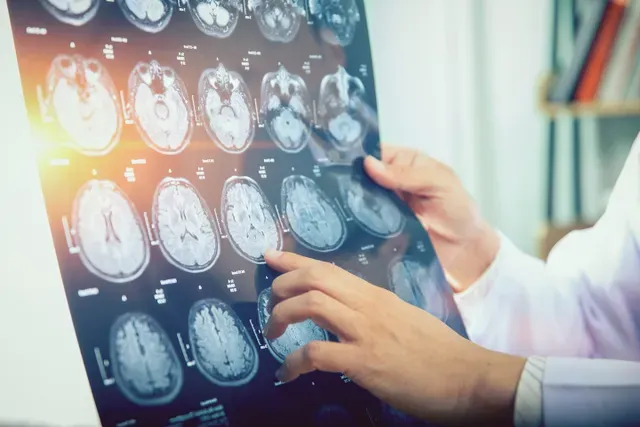Neurological Health And Wellness
Neurology, the branch of medicine that deals with neurological health, focuses on the study of the brain and nervous system, including the spinal cord, peripheral nerves, and cranial nerves. At Nirvana Healthcare Management Services in Essex County, New Jersey, our team of seasoned doctors and physicians specialize in the diagnosis and treatment of various neurological disorders.
The nervous system, comprising the autonomic nervous system, peripheral nervous system, nerve roots, and the brain, has a significant impact on the body’s functioning. Consequently, neurological symptoms can manifest in myriad ways across different individuals. From commonplace to rare neurological conditions, our team at Nirvana Healthcare Management Services is equipped to tackle them all.
The gamut of disorders we handle includes, but is not limited to,
- Alzheimer’s disease: The most prevalent form of dementia, Alzheimer’s progressively impairs memory and cognitive functions. It affects millions of people worldwide and progressively worsens over time.
- Carpal tunnel syndrome: This condition involves pressure on the median nerve within the carpal tunnel, a narrow passage in the palm surrounded by ligaments and bones.
- Diabetic neuropathy: A complication of diabetes, this disorder occurs when high blood sugar levels cause damage to the peripheral nerves, primarily in the legs and feet.
- Migraine: This severe neurological condition causes intense, often one-sided, head pain that goes beyond a typical headache.
- Movement disorders: Conditions like Parkinson’s, Huntington’s disease, and Tourette syndrome that can either inhibit or increase mobility.
- Multiple sclerosis (MS): An autoimmune disease that harms healthy cells and nerve fibers, leading to symptoms like muscle atrophy, balance problems, and vision issues.
- Restless legs syndrome (Willis-Ekbom disease): A disorder characterized by an irresistible urge to move the legs, typically during the evening or nighttime.
- Sciatica: Caused by a herniated disk in the lumbar region, this type of back pain occurs when the disk’s soft center pushes out and pressures nearby nerves.
- Spinal cord disorders: Conditions like degenerative disc disease, spinal stenosis, and abscess that affect the spinal cord.
- Seizures/Epilepsy: Uncontrolled electrical activity between neurons leads to temporary changes in muscle movement and tone. Chronic seizures are known as epilepsy.
- Stroke: Occurs when blood vessels supplying oxygen and nutrients to the brain are blocked or burst, affecting body function depending on where in the brain it occurs.
Our team’s approach to neurology involves an in-depth understanding of how these disorders and diseases affect the nervous system. We use advanced diagnostic techniques to identify conditions that can be caused by factors such as trauma, infection, or genetic predisposition, delivering the highest standard of care for our patients’ unique neurological needs.
About Dementia
As the rate of Dementia, a significant neurological disorder, continues to rise globally, our dedicated providers at Nirvana Healthcare Management Services persistently deepen their knowledge and expertise in understanding this illness and its etiopathology. This commitment to advancing neurological health allows us to better serve the needs of people worldwide affected by this condition.
Dementias, which affect the brain and nervous system, primarily originate from degenerative and vascular pathology, leading to cognitive damage. These pathologies directly impact the function of the nervous system, making it difficult for those affected to carry out everyday tasks. The two most common forms are:
- Reversible Dementia: This form of dementia could stem from multiple medical issues, including thyroid problems, vitamin B12 deficiency, depression, certain medications, normal pressure hydrocephalus, and drugs that block nervous system impulses (anticholinergics). If identified early through proper diagnosis and with effective management of symptoms, this type of dementia can be reversible.
- Vascular Dementia: This disorder is often caused by conditions that reduce blood flow to the brain, limiting the supply of oxygen and nutrients. Such conditions can lead to a decline in thinking abilities and can cause permanent impairment, morbidity, and mortality. This is similar to a stroke, where the blood supply to the brain is compromised.
In addition to these, our team also handles other neurological conditions, such as Alzheimer’s disease and Multiple Sclerosis, and provides care for patients who have experienced trauma or infection. With our comprehensive approach to neurology, we strive to deliver the highest standard of care to all our patients, ensuring they receive the best possible treatment for their unique neurological needs.
Diagnosis and Treatment
At Nirvana Healthcare Management Services, our fully integrated providers firmly believe in the significance of preventative care for neurological disorders. Early intervention before acute and chronic diseases progress too far can significantly mitigate their impact, reducing potential injuries to the central and peripheral nervous system. If a disorder is incurable, our doctors prioritize educating patients on how to manage neurological symptoms effectively, thereby enhancing their quality of life.
Our physicians utilize a comprehensive range of methods to evaluate neurological conditions, many of which meet and even exceed quality standards. For instance, neuro-cognitive tests are employed to assess brain health, particularly in patients exhibiting memory concerns. Transcranial Doppler ultrasounds, another crucial tool, measure the flow within blood vessels in the brain. This evaluation aids in assessing stroke risk, a leading cause of death worldwide.
For extended assessments, we offer Holter monitors. These portable, at-home devices record the patient’s heartbeat for up to 21 days, providing invaluable data on circulation and pressure within the brain and blood vessels. Such diagnostic tools enable healthcare professionals to predict the onset of severe neurological issues that may occur, such as headaches, migraines, seizures, and pseudoseizures with psychological causes.
Neurological conditions can affect people of all ages, but they pose a particular concern for older patients. They face an increased risk for Dementia and Alzheimer’s disease, as well as delirium. The early evaluation and treatment of these disorders significantly contribute to geriatric medicine.
It’s estimated that the number of cases of these disorders will continue to rise, underscoring the essential role of our work. Our primary goal remains to ensure that every patient, regardless of age or condition, receives the highest standard of neurological care.
Medications to Treat Neurological Disorders
There are several medications available to treat a variety of neurological disorders. Cholinesterase inhibitors, such as donepezil (Aricept), galantamine (Razadyne), and rivastigmine (Exelon), are commonly used drugs in this category. Other notable medications include Mianserin for depression, Midodrine for postural hypotension, and Modafinil tablets. Opioids, galantamine, and anticholinesterases like physostigmine and neostigmine have also been isolated from plants, demonstrating the relevance of botanical sources in treating neurological conditions. Lastly, there are newly developed drugs that provide treatments for multiple sclerosis, narcolepsy, migraine, Parkinson’s disease, and pain.
Healthcare Report Cards
At Nirvana Healthcare Management Services, Healthcare Evaluation Profiles are integral to our healthcare strategy. These profiles, constructed following the guidelines set by the United States Task Force, incorporate patients’ medical histories, genetic backgrounds, and any neurological symptoms they may have exhibited. This information is crucial in providing preventative care for neurological disorders. Post each patient visit, these profiles are updated to reflect changing needs and potential diseases, ensuring that our doctors are always aware of the evolving requirements of our patients.
Signs You Need to See a Neurologist
- Persistent or severe headaches: This could be a sign of neurological conditions such as migraines or a brain disorder.
- Chronic pain: Pain that persists or worsens over time can indicate issues with the peripheral nerves.
- Changes in vision: Sudden blurriness, double vision, or loss of vision can be symptoms of serious neurological disorders.
- Difficulty in balancing: Problems with balance or coordination can be a result of issues with the brain and nervous system.
- Frequent or sudden seizures: These are key neurological symptoms of conditions like epilepsy.
- Difficulty in movement: If you’re experiencing problems with movement, such as tremors, clumsiness, or uncontrolled movements, these could be symptoms of disorders like Parkinson’s disease or multiple sclerosis.
- Memory problems or confusion: These could be early signs of Alzheimer’s disease or other types of dementia.
- Muscle weakness or numbness: These can occur as a result of trauma or injury to the spinal cord or peripheral nervous system.
- Changes in mood or behavior: Sudden shifts in mood or behavior can be a result of brain disorders.
- Difficulty in speaking or swallowing: These could be symptoms of neurological conditions affecting the cranial nerves.
- High fever along with a headache or stiff neck: This could be an indication of an infection affecting the nervous system, such as meningitis.
- Stroke symptoms: It is crucial to be aware of the symptoms of a stroke, which include sudden numbness or weakness in the face, arm, or leg, especially on one side of the body. Other symptoms may include sudden confusion, trouble speaking or understanding speech, sudden trouble seeing in one or both eyes, sudden trouble walking, dizziness, loss of balance or coordination, or a sudden severe headache with no known cause. It is important to seek medical attention immediately if any of these symptoms occur.
If you experience any of these symptoms, it’s crucial to seek immediate medical evaluation. Early diagnosis and treatment can greatly contribute to managing neurological disorders and improving patient quality of life.
Find a Neurologist With Nirvana Healthcare Management Services
Experience personalized care at Nirvana Healthcare Management Services. With multiple locations in Newark and East Orange, NJ, including Salerno Medical Associates, Metropolitan Medical Group, Roseville Medical Society, North Ward Medical Arts, and Armenti Medical Group, we’re here to meet your unique healthcare needs. Our team also offers in-home services for seniors from CHOP. Discover the importance of neurological health and wellness by contacting us today.

